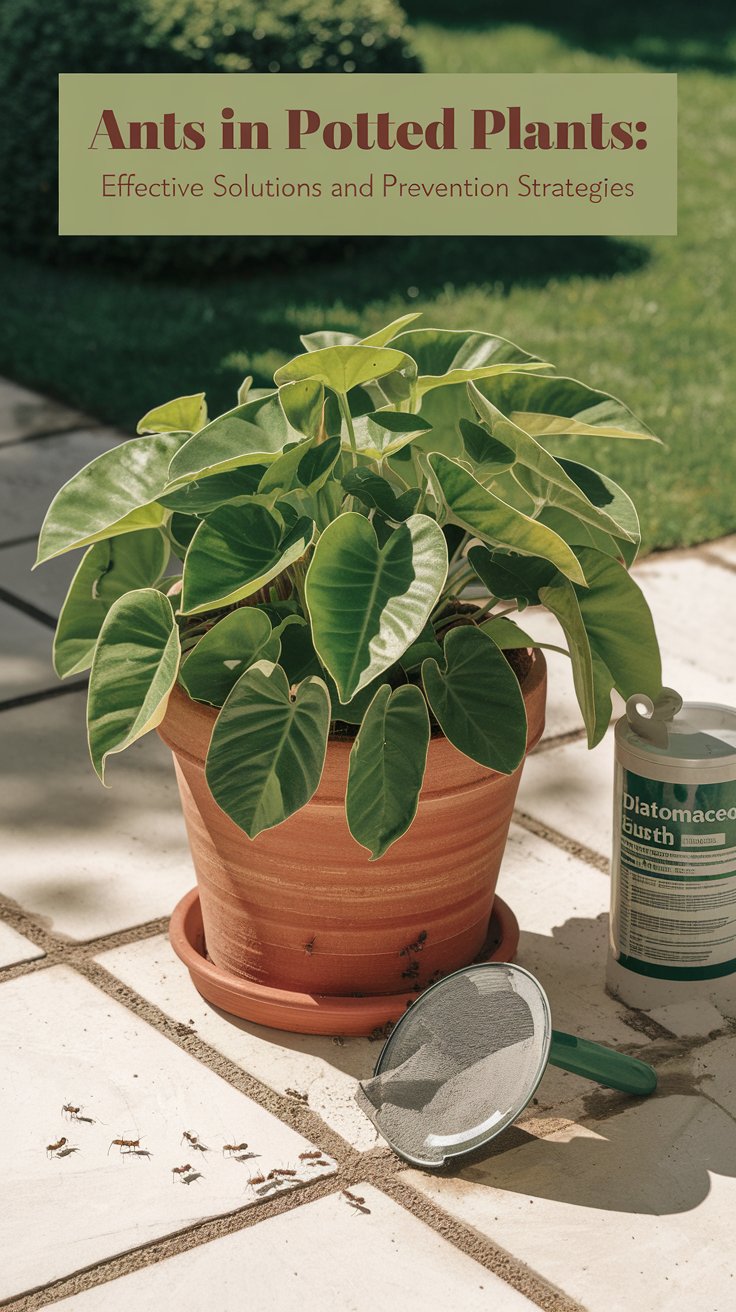Discover effective, eco-friendly solutions for dealing with ants in potted plants. Learn prevention strategies, natural remedies, and when to seek professional help in this comprehensive 2024 guide.
Ants in potted plants can be a persistent nuisance for gardeners, potentially harming plant health and disrupting the enjoyment of your green space. While ants play important roles in ecosystems, their presence in container gardens often indicates underlying issues. With the right approach, you can effectively manage ant infestations in your potted plants using eco-friendly methods that preserve both your plants and beneficial insects.

Hello, I’m Ashley Scott, an urban gardening expert with over 15 years of experience in pest management for container plants. Today, I’m sharing my insights on a common issue many gardeners face: ants in potted plants.
Understanding the Ant Problem in Container Gardens
Ants in potted plants are more than just a minor annoyance. They can:
- Disturb root systems, affecting plant health
- Farm aphids and other harmful pests for their honeydew
- Create unsightly mounds that detract from your garden’s beauty
According to the University of California Integrated Pest Management Program, certain ant species can even damage plant roots directly. Understanding ant behavior is crucial for effective management.
Why Ants Invade Potted Plants
Ants are attracted to potted plants for several reasons:
- Moisture: Consistently damp soil provides a water source
- Food: Decaying plant matter or honeydew from other insects
- Shelter: Pots offer protection from predators and elements
The Royal Horticultural Society notes that while ants can be beneficial in garden ecosystems, their presence in pots often indicates other pest problems.
Eco-Friendly Ant Control Methods for 2024
1. Diatomaceous Earth
Sprinkle food-grade diatomaceous earth around the base of plants. This natural ant deterrent for gardens is safe for plants but deters ants effectively.
2. Neem Oil Solution
Create a neem oil spray, a versatile organic pesticide for container plants that repels ants and treats various other pests simultaneously.
3. Cinnamon Powder
Sprinkle cinnamon around the plant base. This natural ant repellent for houseplants is both effective and aromatic.
4. Beneficial Nematodes
Introduce beneficial nematodes to your potting soil. These microscopic worms are natural predators of ants and other soil pests, offering biological pest control for potted plants.
5. Essential Oil Barriers
Create barriers with peppermint or tea tree essential oils. These strong scents act as natural insect repellents for container gardens.
Prevention Strategies
Preventing ant infestations is key to long-term plant health. Here are some eco-friendly gardening techniques to keep ants at bay:
- Proper Watering: Avoid overwatering, which can attract ants seeking moisture. Use self-watering planters to maintain consistent soil moisture.
- Regular Inspection: Check plants frequently for signs of ants or other pests. Early detection is crucial for effective control.
- Sticky Barriers: Apply sticky barriers around pot rims to prevent ants from climbing. This non-toxic pest control for container plants is especially useful for prized specimens.
- Companion Planting: Grow ant-repelling plants like mint or lavender near susceptible plants. This natural pest control for urban gardens adds beauty while deterring pests.
- Proper Sanitation: Remove dead leaves and debris regularly to eliminate potential ant nesting sites.
When to Seek Professional Help
If DIY methods fail to control the ant problem, it might be time to consult a professional. The National Pest Management Association offers resources for finding qualified pest control experts who can provide targeted solutions for severe infestations.
Innovative Ant Management Technologies for 2024
Smart Pest Monitoring Systems
New IoT-enabled devices can detect ant activity early, allowing for prompt intervention. These smart garden pest detection tools are becoming increasingly popular in urban gardening.
Ultrasonic Repellents
Low-frequency sound devices that deter ants without harming plants or beneficial insects are emerging as a high-tech solution for pest-free container gardening.
Beneficial Microbe Treatments
Soil treatments containing beneficial microorganisms can create an environment less hospitable to ants while improving plant health. These probiotic soil enhancers for potted plants offer a dual benefit of pest control and plant nutrition.
Conclusion
Dealing with ants in potted plants requires a multifaceted approach combining prevention, natural remedies, and innovative technologies. By implementing these eco-friendly strategies, you can maintain a healthy, ant-free container garden while preserving the delicate balance of your urban ecosystem. Remember, persistence and regular monitoring are key to long-term success in managing ants and other pests in your potted plants.
